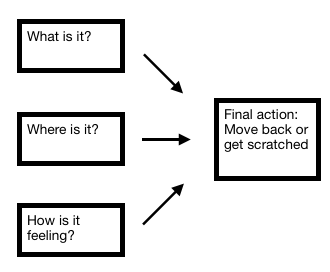
I still remember that moment in elementary school where after several years and many pages of writing out long division and multiplication, we were finally allowed to use calculators in class. I remember thinking ‘why is this five dollar calculator so much faster than me at this?’ I think it bothered me enough that I asked my teacher that same question. She gave me an answer that even a 10-year-old could tell meant that she didn’t really know. To be fair, my question was definitely outside the realm of elementary school maths. To answer it, we need to look at some principles from neuroscience and physics.
Artificial intelligence has been creeping closer and closer to human performance in recent years. The games of Poker and Go, image recognition, and vocabulary translation are all tasks that AI can now perform better than us. AI is likely to continue gaining on us in the future. However there is no chance that we can ever perform basic maths better than a modern computer. To understand why this is, we need to look at two different kinds of processing: serial processing and parallel processing.

Serial Processing
In serial processing we perform a series of steps one after the other. The next step cannot begin until the previous one has been completed. An example of a task that requires serial processing is getting ready for a shower. This is a task that I mastered years ago, so I understand it well. From experience I have learned that you can’t take off your pants before your shoes, and in fact you need to complete all the undressing activities before getting into the shower. We can represent this process with this diagram.

Serial processing is the basic way that all computers operate, and they have some big advantages over humans at completing tasks that lend themselves to this method. We will go into depth on this point a little later.
In parallel processing we can operate two or more processes at the same time. A good example of this is in the way people process visual information. Take this picture as an example:

If we are sitting in front of this cat, a number of different thought patterns will be going on in our heads. One process will be processing spatial information and recognizing that the cat is rather close to us. Another will be searching through our memory to determine if we know this particular cat. A third will be evaluating the emotion of the cat, with reference to the expression on its face and its posture. We can represent this process with a second diagram:

Compared to serial processing we can see that an advantage of parallel processing is that we don’t need to wait to complete one task before starting another.
Let’s go back to my original question about the calculator. Basic maths is a simple, serial operation. In this kind of task, our calculator has two big advantages over us:
- Memory
- Speed
Let’s deal with memory first. When big numbers are involved, basic maths requires us to hold large numbers of digits in our memory. Most people struggle to hold more than seven to nine random digits in our working memory. We can of course write them down, but this takes a bit of time. By comparison, even calculators from the 80s have no problem with working with a couple of 10 digit numbers.

Speed is where it gets interesting. Most people would guess that computers would have a speed advantage over us, but are very likely to underestimate just how big that advantage is. Signals inside our brain can can travel from one neuron to another at the speed of approximately 150 metres per second. Electrical signals inside the processor of a computer can travel at the speed of light- 300,000,000 metres per second. In serial processing we can never compete with something that thinks around 2 million times faster than us. It is a testament to how amazing our brains really are that we are still able to outperform computers at most tasks due to far higher complexity, parallelisation and efficiency
For a detailed explanation of exactly how a calculator converts digits to binary information and performs the calculations check out this excellent article here.
Conclusion
My calculator is far faster than me at basic maths because it has a better memory for random digits, and has a massively faster internal processing speed. Basic maths is a task that requires simple, serial processing-something that computers are great at. Back when humans were still evolving, living in caves, and avoiding tigers, there was no need to regularly work with numbers greater than 10 or so. Our brains are just not designed to perform this kind of task. The flexibility and ability to learn of the human brain has allowed us to learn how to do maths, and to design tools that can perform the task better than us. Just like my elementary school calculator.
In the next article in this series I will discuss how artificial intelligence is starting to learn to ‘think’ in parallel.
You got a 28.57% Upvote and Resteem from @ebargains, as well as upvotes from our curation trail followers!
If you are looking to earn a passive no hassle return on your Steem Power, delegate your SP to @ebargains by clicking on one of the ready to delegate links:
50SP | 100SP | 250SP | 500SP | 1000SP | 5000SP | Custom Amount
You will earn 80% of the voting service's earnings based on your delegated SP's prorated share of the service's SP pool daily! That is up to 38.5% APR! You can also undelegate at anytime.
We are also a very profitable curation trail leader on https://steemauto.com/. Follow @ebargains today and earn more on curation rewards!
Downvoting a post can decrease pending rewards and make it less visible. Common reasons:
Submit
This is a fantastic post! Thanks so much for sharing. I have never even thought to ask the question, "why are calculators faster?". I found you through the #payitforward contest. You were featured by @agmoore. Congratulations.
Downvoting a post can decrease pending rewards and make it less visible. Common reasons:
Submit
Thanks for reading. I think things like curation contests are really important to new users. Otherwise your posts tend to disappear into the depths of Steemit
Downvoting a post can decrease pending rewards and make it less visible. Common reasons:
Submit
You have been upvoted by the @sndbox-alpha! Our curation team is currently formed by @jeffbernst, @bitrocker2020, @jrswab & @teachblogger . We are seeking posts of the highest quality and we deem your endeavour as one of them. If you want to get to know more, feel free to check our blog.
Downvoting a post can decrease pending rewards and make it less visible. Common reasons:
Submit
Thanks very much!
Downvoting a post can decrease pending rewards and make it less visible. Common reasons:
Submit
You were featured by @agmoore in the Pay It Forward contest , That is how I come to your post
Downvoting a post can decrease pending rewards and make it less visible. Common reasons:
Submit
Thanks, good to know what is working
Downvoting a post can decrease pending rewards and make it less visible. Common reasons:
Submit
Good one mate
I can not tel about the complex ones but for normal calvulations vedic maths is almost fast and efficient as calculator, which a person can perform.
Downvoting a post can decrease pending rewards and make it less visible. Common reasons:
Submit
I just googled Vedic math, hadn't heard of it before. Maybe I would have done better at Elementary school maths if I had learned it!
Downvoting a post can decrease pending rewards and make it less visible. Common reasons:
Submit
A wonderful article. I actually learned something new, something I understand thoroughly now, because of your explanation. Also great picture of a cat :)
Downvoting a post can decrease pending rewards and make it less visible. Common reasons:
Submit
Yeah that's an unhappy cat. Glad you liked the post, I think it's an interesting topic. The potential of artificial intelligence is a little scary.
Downvoting a post can decrease pending rewards and make it less visible. Common reasons:
Submit
I just nominated this post for entry into a contest here: https://steemit.com/payitforward/@thedarkhorse/pay-it-forward-curation-contest-week-5-win-sbi-and-steem-bounty
I'm not sure I've done it properly, so good luck :)
Downvoting a post can decrease pending rewards and make it less visible. Common reasons:
Submit
Thanks very much:)
Downvoting a post can decrease pending rewards and make it less visible. Common reasons:
Submit
I will be featuring it in my weekly #technology and #science curation post for the @minnowsupport project and the Creators' Guild! The @creatorsguild is a new group of Steem bloggers and content creators looking to improve the overall quality of their niche.
Wish not to be featured in the curation post this Friday? Please let me know. In the meantime, keep up the hard work, and I hope to see you at the Creators' Guild!
If you have a free witness vote and like what I am doing for the Steem blockchain it would be an honor to have your vote for my witness server. Either click this SteemConnect link or head over to steemit.com/~witnesses and enter my username it the box at the bottom.
Downvoting a post can decrease pending rewards and make it less visible. Common reasons:
Submit
Congratulations! This post has been upvoted from the communal account, @minnowsupport, by FlyingKiwi from the Minnow Support Project. It's a witness project run by aggroed, ausbitbank, teamsteem, theprophet0, someguy123, neoxian, followbtcnews, and netuoso. The goal is to help Steemit grow by supporting Minnows. Please find us at the Peace, Abundance, and Liberty Network (PALnet) Discord Channel. It's a completely public and open space to all members of the Steemit community who voluntarily choose to be there.
If you would like to delegate to the Minnow Support Project you can do so by clicking on the following links: 50SP, 100SP, 250SP, 500SP, 1000SP, 5000SP.
Be sure to leave at least 50SP undelegated on your account.
Downvoting a post can decrease pending rewards and make it less visible. Common reasons:
Submit